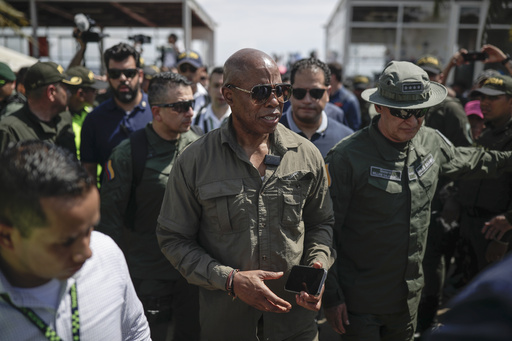NYC mayor concludes Latin America trip with ‘right to work’ call for migrants

New York City Mayor Eric Adams arrives in Necocli, northern Colombia, Saturday, Oct. 7, 2023. Adams has capped off a four-day trip to Latin America with a visit to the city where thousands of migrants start the trek across the Darien jungle, as they head to the United States. AP
NECOCLI, Colombia — New York City Mayor Eric Adams capped off a four-day trip to Latin America on Saturday by calling for a “right to work” for migrants in the United States.
He spoke during a visit to Necocli, the northern Colombia town where thousands of migrants start the perilous trek across the roadless Darien jungle into Panama, as they head for the U.S.
Speaking from a dock where migrants take boats toward the jungle, Adams said countries in the region need to “come together” to find solutions to the immigration crisis being felt across the Americas as well as in cities in the United States, including New York.
He called on the U.S goverment to find pathways for migrants and asylum seekers to work legally in the United States.
“When you look at Colombia they have really shown how to absorb individuals into their societies, and one of the most important ways to do it is to allow people to work,” Adams told reporters in Necocli. “Nothing is more humane and, nothing is more American than your right to work, and we believe that is a right we should extend.”
Article continues after this advertisementNew York City has struggled to provide emergency accommodation to tens of thousands of migrants who have arrived in the city this year, with Adams and other city leaders calling on the federal government to speed up work authorizations for those who are already in the city.
Article continues after this advertisementA unique rule dating from the 1980s requires New York to provide shelter to anyone in need. Adams has said the cost of supporting migrants could climb to $12 billion in the following three years, and this week challenged the statute that obliges the city to provide migrants with shelter.
The mayor also went to Ecuador and Mexico during his whistlestop tour, where he visited shelters for migrants and spoke to local legislators.
After stopping in Mexico’s Puebla state, Adams said his city is “at capacity.”
“Our hearts are endless, but our resources are not,” Adams told reporters. “We don’t want to put people in congregate shelters. We don’t want people to think they will be employed.”
In Colombia, Adams said his goal is not to tell migrants what they should do, but to learn about their motives and find solutions to the immigration crisis.
The South American country has received 2.8 million migrants from Venezuela over the past seven years, and enabled them to apply for 10-year residency permits that also give them access to health and education services.
But despite the effort to regularize Venezuelan migrants, many are heading to the United States after struggling to rebuild their lives in Colombia and other South American countries, where economies are still reeling from the pandemic.
According to Panama’s National Immigration Service, more than 200,000 Venezuelans crossed the Darien Gap this year on their way to the United States. Many are moving for the second or third time, after living in South American countries like Colombia, Chile and Peru.
This week the Biden administration struck a deal with Venezuela’s socialist government to resume direct deportations flights to Venezuela and said that Venezuelans who do not qualify for ayslum will be returned to their homeland.
In Necocli, some Venezuelan migrants headed north said they would persist in their trek to reach the U.S. border despite the new policy.
“Getting in (the U.S.) is also a matter of luck,” said Miguel Ruben Camacaro, a Venezuelan migrant travelling with his two children and sleeping on a tent at Necocli’s beach. “We will chase the dream, until there are no other options.”
At a news conference later in Bogota, Adams said countries like Colombia need more support with programs that incorporate migrants so people don’t make the dangeous trek north.
The mayor described the visit as an eye opener, saying he was saddened to see dozens of families with children sleeping on the beach at Necocli in tents while they gather enough money to take boats toward the Darien jungle.
“What I don’t want is what I saw on the beach area of Colombia to play out in the streets of New York City,” Adams said. “We all want to help as many people as possible, we want to uphold our values as a city of immigrants. But to do that we need to stabilize the situation.”